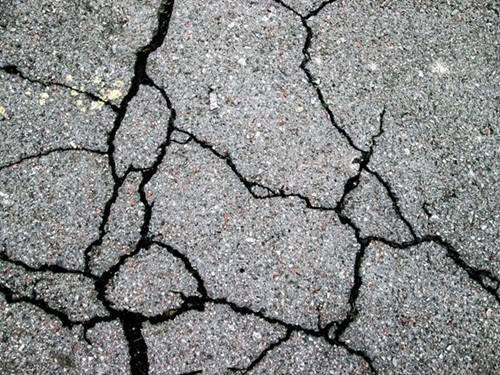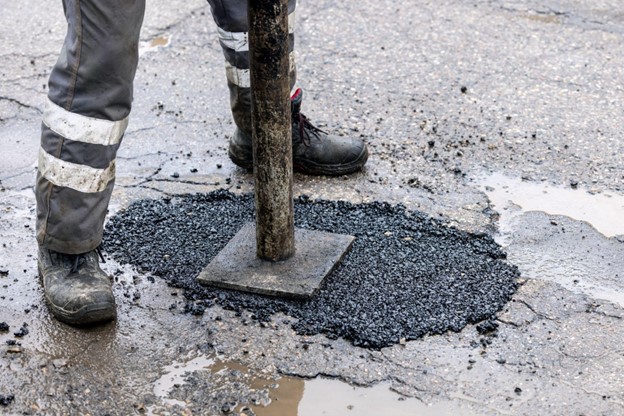 Tuesday, October 22, 2024
Tuesday, October 22, 2024  Tuesday, October 22, 2024
Tuesday, October 22, 2024 
Is your asphalt driveway starting to show signs of wear? You may have noticed some unsightly cracks or deep pits forming after a harsh winter. While asphalt driveways are well-regarded for their resilience, they aren’t immune to the effects of time and the elements. Regular maintenance and prompt attention to any issues can help prolong your driveway’s life and save you from costly repairs. In this guide, we’ll explore the common signs that your asphalt driveway needs repair, delve into effective repair techniques, and discuss when to call in a professional asphalt contractor.
Asphalt driveways are known for their durability and functionality but are not immune to wear and tear. Regular maintenance and timely asphalt driveway repair are essential for extending the life of your driveway. Recognizing the early signs of damage can save homeowners from later costly replacements. In this section, we’ll discuss common signs that indicate your asphalt driveway needs repair, the scenarios when it might not be time to repair, and the reasons behind asphalt cracking. This knowledge will empower you to maintain your driveway effectively while understanding when to call an asphalt contractor best.
One of the first indicators that your asphalt driveway needs repair is the presence of deep pits. These depressions are often caused by water infiltration, especially during winter’s freeze-thaw cycles. When water seeps into the asphalt cracks and freezes, it expands, causing the surrounding material to crack and eventually pit. These pits can worsen if left untreated, leading to larger holes and a compromised driveway structure. Not addressing these issues can lead to more severe damage, such as potholes, which can be more costly.
Over time, large holes can develop in your driveway, primarily due to erosion from water and traffic stress. Heavy vehicles can contribute significantly to the degradation of asphalt, leading to significant voids in the surface. As these holes grow, they pose a nuisance and a safety hazard for vehicles and pedestrians alike. Addressing these holes promptly through appropriate asphalt repair methods can help restore your driveway’s integrity.
A rough, pitted surface makes cleaning and maintaining your driveway challenging. Rough pitting can accumulate debris and moisture, further deteriorating the asphalt. Regular sweeping or cleaning becomes less effective with rough surfaces, increasing the risk of deeper damage. If you notice that your driveway feels uneven and difficult to maintain, it may be time to consider repair options.
Cracks that are wider than a quarter-inch deserve immediate attention. These cracks allow water to infiltrate the base layer of the driveway but can also expand over time due to freeze-thaw cycles and regular traffic. If these cracks are ignored, they can lead to further structural issues, including larger cracks and breaks. Addressing wide cracks with proper sealants or fillers is crucial to prevent more severe damage. Check out Economy Paving and go to their homepage for detailed information about asphalt driveway repair, maintenance and resurfacing services.
While light pitting may appear unsightly, it is often a normal part of an aging asphalt driveway. This type of wear and tear typically doesn’t compromise the overall structure of the driveway and can be remedied with a simple seal coating every few years. Monitoring light pitting is essential, but immediate repair action may not be necessary.
Oil stains are another common occurrence on asphalt driveways, particularly if vehicles park regularly. While oil stains can be cleaned with appropriate degreasers and diminish your driveway’s aesthetics, they usually do not warrant urgent repair. However, regular cleaning is advised to prevent further penetration into the asphalt.
Minor sealant peeling in localized areas generally does not affect the driveway’s integrity. This damage can typically be addressed with spot treatments, such as applying a new sealant layer or using a sealant patch instead of full sealing. It is advisable to keep an eye on these areas but understand that they do not pose an immediate threat.
Hairline cracks may seem alarming, but they are often not urgent. While they should be monitored closely, they typically do not require immediate intervention. Applying a crack filler or sealant can help prevent these small cracks from expanding into larger issues, making timely maintenance essential.
A new asphalt driveway can cost around $7,500 on average. Timely repairs can be a cost-effective alternative to replacement, helping you avoid the expense of a complete driveway overhaul.
Understanding the causes of asphalt cracks can help you take preventive measures and address issues promptly. Here are some common reasons why asphalt may crack:
Freeze and thaw cycles are a major contributor to asphalt cracking. When water infiltrates the asphalt and freezes, it expands, causing it to crack. This process can lead to significant damage if not addressed through regular maintenance and timely repairs.
Heavy loads from frequent vehicle traffic can cause asphalt surfaces to degrade. The stress from heavy vehicles can lead to cracks and surface damage. Proper maintenance and reinforcement can help mitigate this issue.
Tree roots can push below the asphalt, causing cracks and uneven surfaces. If you have trees near your driveway, their roots can disrupt the asphalt and lead to cracking. Addressing root issues and repairing the surface can help maintain the integrity of your driveway.
Lack of maintenance is a significant factor in asphalt deterioration. Asphalt can quickly degrade without proper sealing and upkeep, leading to cracks and other issues. Regular maintenance, including seal coating and repairs, can extend the life of your asphalt driveway. Regular maintenance can save you from costly repairs and prolong the life of your driveway.
Repairing large cracks in your asphalt driveway is crucial for maintaining its integrity and prolonging its lifespan. Large cracks can allow water intrusion, leading to more significant damage, such as potholes or structural failures. Here’s a step-by-step guide to help you effectively repair large cracks in your driveway.

Patching an asphalt driveway is a straightforward process that can significantly enhance its functionality and aesthetic appeal. Whether you’re dealing with small potholes or larger damaged areas, proper patching techniques can extend the life of your driveway. Here’s how to properly patch an asphalt driveway:
Knowing when to call a professional for asphalt repair services can save you time, money, and hassle. While minor repairs like filling small cracks or patching potholes can often be tackled as DIY projects, some situations demand the expertise of an asphalt contractor for safety and durability. For extensive damage or complex repairs, it’s crucial to consult a reputable paving company experienced in handling asphalt driveways.
Every homeowner deserves a beautiful and functional driveway. Taking the initiative to address issues with your asphalt driveway can significantly extend its lifespan and improve the overall appearance of your home. Remember, a little effort invested today can lead to significant savings tomorrow, keeping your driveway looking fantastic for years. Small cracks can lead to big problems if ignored. Reach out today for timely solutions that will extend the life of your driveway and save you money in the long run.